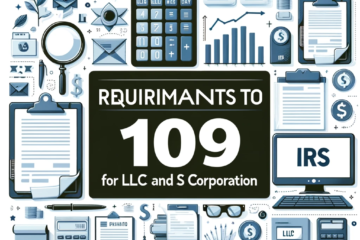Starting a business? An LLC, or limited liability company, is a great choice for many small businesses and startups. Forming an LLC can protect your personal assets, provide tax benefits, and give your business credibility. Although the process does vary by state, applying for an LLC is easier than you may think. This comprehensive guide will walk you through every step, from choosing a business name to submitting your paperwork and fees. Let’s get started!
In this guide, you’ll learn:
- What an LLC is and its key benefits
- How to check if your business name is available
- Understanding single-member vs multi-member LLCs
- Steps for completing your state’s articles of organization
- Getting an EIN from the IRS
- Creating an operating agreement
- Additional requirements like licenses and permits
- Submitting your application and paying fees
- FAQs on applying for an LLC
What is an LLC?
An LLC, or limited liability company, is a business structure that combines aspects of partnerships and corporations. Unlike a sole proprietorship or general partnership, an LLC provides liability protection for its owners (called “members”). The LLC’s debts and liabilities remain at the company level instead of extending to the members’ personal assets.
LLCs are popular among small businesses and startups because they provide liability protection with less paperwork and fewer formalities than a corporation. However, LLCs also allow members flexibility in structuring management and dividing profits.
Here are some of the key advantages of forming an LLC:
- Limited personal liability – Members’ personal assets are protected from business debts and claims.
- Pass-through taxation – Profits/losses pass through to members’ personal tax returns. No corporate taxes.
- Operational flexibility – Less paperwork than a corporation. Management structure is flexible.
- Credibility – LLC conveys a more formalized business structure than a DBA or partnership.
Checking Business Name Availability
The first step is making sure your preferred business name is available in your state. Every state has its own rules around what makes a business name distinguishable. Most states also have a database where you can search to see if a name is taken.
To check name availability:
- Search your state business database. Look for a “Business Name Search” option through your Secretary of State or corporations division website.
- Avoid restricted words. Words like “bank,” “trust,” “insurance” may be restricted. Check your state’s requirements.
- Search the USPTO database. Look for trademarks similar to your name in the USPTO’s TESS system.
- Google it. Search online to make sure another business isn’t already using your proposed name.
- Consider alternatives. Have a few backup names in case your first choice isn’t available. You can always do a DBA later.
Once you’ve settled on an available business name, some states allow you to reserve it for a period of time while you complete the application process.
Single-Member vs Multi-Member LLCs
LLCs can be structured as single-member or multi-member. This refers to the number of owners (members) in the LLC:
- Single-member LLC – One owner. Simpler setup but no partner for investment/skills.
- Multi-member LLC – Two or more owners. More funding and expertise but decisions and profits are split.
Most states allow single-member LLC formation, which is simpler for a solo entrepreneur. Multi-member LLCs require an operating agreement to structure management and profit distribution amongst members.
Both entity types benefit from limited liability. But single-member LLCs have different tax treatment than multi-member LLCs. Speak with an accountant or tax advisor about the best structure for your business.
Learn Also: What is the Difference between Single Member LLC vs Multi Member LLC?
Completing Your State’s Articles of Organization
The articles of organization (also called a certificate of formation or charter) are the core documents required to form your LLC. While specific requirements vary, articles of organization typically include:
- Business name and address
- Registered agent’s name and address
- Names and addresses of members (for multi-member LLCs)
- Signature(s) of organizers
- Filing fee payment
Some states may also request:
- Description of business purpose
- Effective date of formation
- Duration of LLC
Double check your state’s exact requirements for articles of organization before submitting them. Many states provide templates and instructions on what to include.
Applying for an EIN from the IRS
Even if you don’t have employees, your LLC needs its own Employer Identification Number (EIN) for tax purposes. An EIN is like a Social Security Number for your business.
Apply for an EIN through the IRS either online or by completing Form SS-4. You’ll typically get your EIN immediately online or within a few days by mail.
Make sure to include your EIN on any bank accounts, licenses, tax filings, and other documents for your LLC.
Creating an Operating Agreement
An operating agreement outlines the LLC’s financial and operational decisions, like:
- Member responsibilities
- Profit/loss distribution
- Adding/removing members
- Dissolution procedures
Single-member LLCs can use a simple operating agreement. Multi-member LLCs require a more detailed agreement to define complex member relationships. While not required in most states, an operating agreement is highly recommended.
See examples and templates for single-member and multi-member operating agreements. Consider customizing based on your specific business needs.
Obtaining Business Licenses and Permits
Depending on your industry and location, your new LLC may need additional registrations and permits like:
- Business license – Required in some cities/counties to operate a business.
- Sales tax permit – Needed if you’ll be collecting sales tax from customers.
- Food permits – For restaurants/food-based businesses there are health department permits.
- Trade licenses – Common for service professionals like contractors, accountants, lawyers, etc.
- Zoning permits – If you have a physical business location, you may need approval for permitted commercial use.
Research requirements for your specific business activities in the appropriate city, county, and state jurisdictions. The Small Business Administration provides helpful information on common licenses and permits.
Submitting Your LLC Application and Fees
Once your documents are complete, it’s time to officially register your LLC by submitting everything to your state.
- Print completed forms. This usually includes at least the articles of organization. Make copies.
- Calculate filing fees. These vary by state, typically $50-$500. Double check current rates.
- Pay filing fees. Options may include checks, money orders, or online payments.
- Submit packet. Mail in or deliver paperwork and payment to your state’s business filing office.
- Check processing time. Approval can take 2-6 weeks typically. You can request expedited filing for an additional fee in most states.
That’s it – wait for your paperwork and welcome kit to arrive! Once approved, your LLC is officially registered and authorized to operate in your state.
Conclusion
The process of applying for an LLC is very approachable, especially with today’s online filing options. While requirements vary across states, the basic steps include choosing a business name, filing articles of organization, getting an EIN, drafting an operating agreement, obtaining necessary licenses, and submitting your paperwork with state filing fees.
Forming an LLC provides valuable liability protection and credibility for small business owners. Taking the time to properly set up your LLC will pay off both legally and financially down the road. You’ve got this!
Frequently Asked Questions (FAQs)
1. What information do I need to provide in my LLC articles of organization?
The articles of organization will require your LLC’s name and address, registered agent’s info, member names and addresses (for multi-member LLCs), organizer signature, and filing fees. Requirements vary by state but this covers the basics.
2. Do I need to publish a public notice after filing my LLC?
Publishing a notice in a local newspaper was required in some states historically. However, today most states no longer require public notice for forming an LLC. Check with your state to be sure.
3. How much does it cost to form an LLC?
The cost to form an LLC ranges from $50 to $500 typically, depending on your state. This covers the filing fee only. Additional costs may apply for legal/filing services, registered agent fees, permits, etc.
5. Can I form an LLC without a lawyer?
Yes, you can form an LLC without a lawyer in most states. Many entrepreneurs choose to use online filing services to handle paperwork and submission. Legal advice may still be recommended for specific business needs.
6. How long does it take to get LLC approval after submitting paperwork?
Approval times range from 2-6 weeks typically after submitting your articles of organization and fees. Many states offer expedited filing for an additional cost, which can reduce wait times to just 1-5 days.

Tim Kelly, J.D., is a legal writer for LawInfo.com. He holds a law degree from Mitchell Hamline School of Law in St. Paul, Minnesota. Tim has a background in retail copywriting and entertainment journalism, with his work being featured in various publications, including the New York Times and EW.com. In 2017, he transitioned into the legal industry, specializing in intellectual property and small business law. Tim resides in the Twin Cities and takes great joy in being a husband, father, and passionate record collector.






